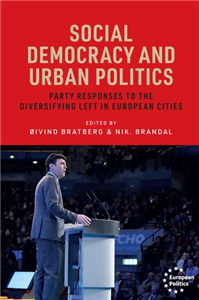Social democracy and the urban scene
Party responses to the diversifying centre-left
by Nik. Brandal, Øivind Bratberg
Description
More Information
Rights Information
Albania, Algeria, Angola, Argentina, Armenia, Australia, Austria, Bahrain, Belgium, Belize, Benin, Bolivia, Bosnia and Herzegovina, Botswana, Brazil, Bulgaria, Burkina Faso, Burundi, Cameroon, Canada, Cape Verde, Central African Republic, Chad, Chile, China, Colombia, Comoros, Congo [DRC], Congo, Republic of the, Costa Rica, Ivory Coast, Croatia, Czech Republic, Denmark, Djibouti, Ecuador, Egypt, El Salvador, Equatorial Guinea, Eritrea, Estonia, Ethiopia, Faroe Islands, Finland, France, French Guiana, Gabon, Gambia, Georgia, Germany, Ghana, Greece, Guatemala, Guinea, Guinea-Bissau, Guyana, Honduras, Hongkong, Hungary, Iceland, India, Indonesia, Iran, Iraq, Ireland, Israel, Italy, Japan, Jordan, Kazakhstan, Kenya, Kuwait, Latvia, Lebanon, Lesotho, Liberia, Libya, Lithuania, Luxembourg, Macau, China, Macedonia [FYROM], Madagascar, Malawi, Malaysia, Mali, Malta, Mauritania, Mauritius, Mayotte, Mexico, Mongolia, Montenegro, Morocco, Mozambique, Namibia, Netherlands, New Zealand, Nicaragua, Niger, Nigeria, Norway, Oman, Pakistan, Panama, Paraguay, Peru, Philippines, Poland, Portugal, Puerto Rico, Qatar, Reunion, Romania, Russia, Rwanda, Saint Helena, Sao Tome and Principe, Saudi Arabia, Senegal, Serbia, Seychelles, Sierra Leone, Singapore, Slovakia, Slovenia, Somalia, South Africa, South Korea, Spain, Sri Lanka, Sudan, Suriname, Swaziland, Sweden, Switzerland, Syria, Taiwan, Tanzania, Thailand, Timor-Leste, Togo, Tokelau, Tunisia, Turkey, Uganda, Ukraine, United Arab Emirates, United Kingdom, United States, Uruguay, Venezuela, Vietnam, Western Sahara, Yemen, Zambia, Zimbabwe, South Sudan, Cyprus, Palestine, Bangladesh, Cambodia, Liechtenstein, Azerbaijan, Jamaica, Kyrgyzstan, Dominican Republic, Myanmar, Monaco
Endorsements
The contemporary left is torn between two electorates: socially conservative working-class voters and a liberally inclined middle class. Are politics and policies that appeal to both even a possibility? Nowhere is this dilemma more acute than in the bigger cities; and yet in no other political space are answers more likely to be found. It is here that a new progressive coalition is being shaped between social democratic, green and radical left parties, driven by new policies and a changing interface towards social movements, but also internal competition over voters. Social democracy and urban politics delves into the changing relationship between these three party families on the urban scene. Through a set of case studies and conceptual chapters, this book examines the electoral geography, governing strategies and mobilisation of the broad left. Attention is directed towards the structural conditions of European cities as well as parties' response to them. The volume is further focused on the relationship between parties and civil society, and reflects upon how the left may learn from activism and localism outside of party structures. If there is a future for social democratic politics, it requires lessons to be learnt and contradictions to be resolved. By homing in on unfolding processes in European cities, Social democracy and urban politics offers insight into the formation and dilemmas of a broader progressive alliance.
Reviews
The contemporary left is torn between two electorates: socially conservative working-class voters and a liberally inclined middle class. Are politics and policies that appeal to both even a possibility? Nowhere is this dilemma more acute than in the bigger cities; and yet in no other political space are answers more likely to be found. It is here that a new progressive coalition is being shaped between social democratic, green and radical left parties, driven by new policies and a changing interface towards social movements, but also internal competition over voters. Social democracy and urban politics delves into the changing relationship between these three party families on the urban scene. Through a set of case studies and conceptual chapters, this book examines the electoral geography, governing strategies and mobilisation of the broad left. Attention is directed towards the structural conditions of European cities as well as parties' response to them. The volume is further focused on the relationship between parties and civil society, and reflects upon how the left may learn from activism and localism outside of party structures. If there is a future for social democratic politics, it requires lessons to be learnt and contradictions to be resolved. By homing in on unfolding processes in European cities, Social democracy and urban politics offers insight into the formation and dilemmas of a broader progressive alliance.
Author Biography
Nik. Brandal is Associate Professor at the Institute of Political Science and International Relations, Oslo New University College. Øivind Bratberg is Senior Lecturer at the Department of Political Science, University of Oslo.
Manchester University Press
Manchester University Press is a leading UK publisher known for excellent research in the humanities and social sciences.
View all titlesBibliographic Information
- Publisher Manchester University Press
- Publication Date October 2025
- Orginal LanguageEnglish
- ISBN/Identifier 9781526180940 / 1526180944
- Publication Country or regionUnited Kingdom
- FormatPrint PDF
- Pages352
- ReadershipCollege/higher education; Professional and scholarly
- Publish StatusPublished
- Dimensions234 X 156 mm
- Biblio NotesDerived from Proprietary 5920
- SeriesEuropean Politics
- Reference Code15713
Manchester University Press has chosen to review this offer before it proceeds.
You will receive an email update that will bring you back to complete the process.
You can also check the status in the My Offers area

Please wait while the payment is being prepared.
Do not close this window.



